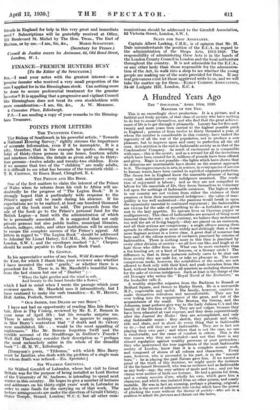A Hundred Years Ago This is an exceedingly clever production.
It is a picture, and a faithful and lively picture, of that class of society who have nothing
to do but to amuse themselves, and who find that the great achieve.
ment of life is to get through it pleasantly. Luxury has for five-and - twenty and more years been carried to the highest possible pitch in England ; persons of from twelve to thirty thousand a year, of whom the number is considerable in this country, have tasked the ingenuity of all the rest of the population, not to produce a new pleasure, but to improve upon and carry to perfection all the old ones. Anti-attrition is the end in fashionable society as in that of the Coachmakers' Company. As much of excitement as is compatible with ease,—this is the secret; and as a reward for all the inventions which have been created for it, millions of pounds have been offered and given. Magic is not possible—the lights which have shown that its delusions are unattainable have shown us the nearest approach to it. The improvements in arts, in science, in everyspecies of service to human wants, have been carried to a pitch of exquisite perfection. The chosen feiv in England know the miserable pleasure of having
every wish anticipated—every indulgence unearned. The condi- tion of enjoyment is labour • and as they are not compelled to
labour for the essentials of de, they doom themselves to voluntary
• toil upon the nothings of fashionable existence. The highest ranks in our country are not vicious from either the violence of their
passions or from their unrestrained indulgence : the value of tran- quillity is too well understood 'thepassions would break in upon the equanimity essential to continued enjoyment ; the fashionables are vicious for the sake of something to do—a forbidden act gives
zest to the lazy appetite. No epicure lives on Cayenne pepper or mulligatawney. This class of fashionables are accused of being more
immoral than the rest ; on the contrary, we believe they understand too well the art of living happily—they are placed on an eminence, and all their actions are conspicuous ; a single offence among .them spreads its offensive glare more widely and strikingly than a dozen more flagrant actions in a lower class. A great deal of nonsense has been said of the odious system of exclusion practised by coteries of fashionables. There is nothing more in this than is praetiaed by every other division of society—we all love our like, and laugh at or hate those who differ from us. What can be more exclusive than
a fox-hunting set,- or a knot of lawyers, or a literary circle ? The
difference is, that in these instances nobody cares to be shut out from society they are unfit for, or take no pleasure in. The more conspicuous ranks, however, the notabilities of the mode, are not
allowed to flock only with their kind, and push intruders from the herd, without being attacked in all quarters as secluding themselves
for the sake of vicious indulgence. Such at least is the charge of the old Dowager who writes the " Royal Novel of the Exclusives," as the bookseller calls it.
A wealthy slopseller migrates from the Barbican to Russell or Bedford Square, and thence to Harley Street, He is a mercantile
M.P., respectable and useful. His family, however, contrive to make themselves ridiculous and uncomfortable. They are for ever toiling into the acquaintance of the great, and out of the acquaintance of the small. The Browns. the Greens, and the Johnsons, must perforce give way to the Lady Juliana C.'s and the family of the Duchess of D.'s. They are not vulgar, because 'they have been educated at vast expense, and they dress superstitiously after. the Journal des Modes : they are accomplished, and only sing - fashionable music : they sketch, they galopade and waltz, ride and skate, and in short do every thing that is fashiOnable to do ;—but still they are not fashionable. They are in fact not playing their own part ;'• and where that is not the case, no one is comfortable, nor the cause of comfort in others. This is the true reason why they are excluded—and not that there is any absurd regulation against wealthy parvenus or poor pretenders : they who understand the true ingredients of the most fashionable society of London, know that it is a complete mosaic work, and composed of stones of all colours and characters. Every man, however, who is successful in his part, is to the " manner born" : he is playing the part Nature gave him. If we wanted a proof of the truth of this doctrine, we might quote the instance of the far-famed Brummell, who was as exclusive and as fashionable as any body—nay, the very arbiter of mode and ton ; and yet his claims were neither of birth nor fortune. He had a genius for dress, and a certain maniire d'elre, wholly his own, which gave him a character, and which was imitated from no other person, and nearly imitable. He was in. fact an amusing, perhaps a pleasing, original ; and this is the secret of admission into circles which have the power of plucking the roses without the thorns' of society—who are in a position to admit the farceurs and thrust out the bores.


























































 Previous page
Previous page